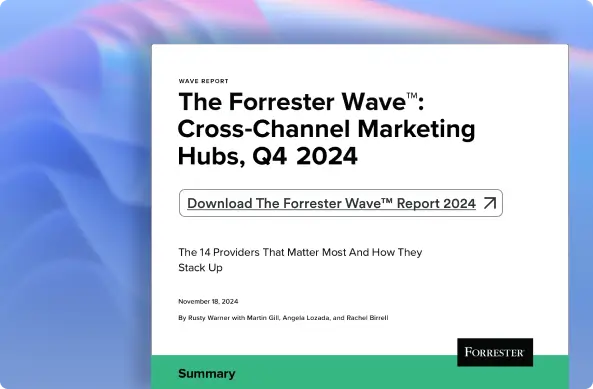What Is Conversational Commerce and How Can It Help Your Business?
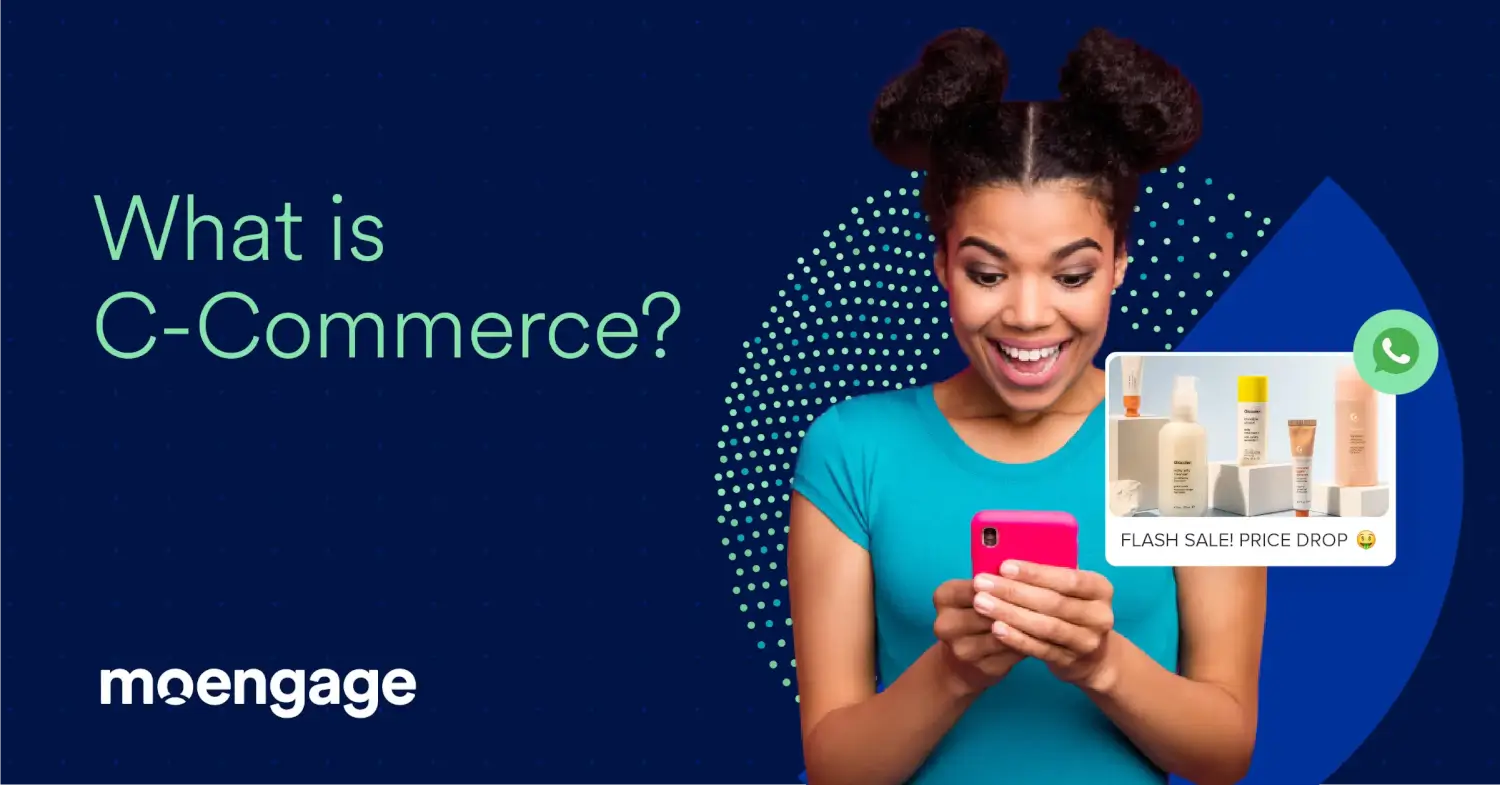
Reading Time: 9 minutes
| 🔍 Download Ebook here to understand how to use Whatsapp Business for marketing and conversational commerce. |
The World of C-commerce and How It Can Help Your Business Grow!
Consider this: of the top 10 downloaded apps in 2022, 6 were messaging apps! In the US alone, the time spent by adults on messaging apps has increased by over 30% in the last four years. Uber’s Chris Messina picked up on this trend very early and came up with the idea of Conversational Commerce or C-Commerce in a Medium post in 2015.
Conversational Commerce is getting a lot of attention from the biggest brands today because it allows you to directly engage with your customers personally and deliver exactly what they are looking for.
WhatsApp alone delivers about 100 billion messages daily. Other instant messaging platforms worldwide have seen tremendous growth levels too, both in the total number of customers and the time spent on the app.
In such an environment, it’s crucial that all marketers have a good understanding of conversational commerce and how it works.
So, we are here to help you get an understanding of what C-Commerce is, why it is useful, how it’s employed, and what you can do to come up with a conversational commerce strategy that enhances customer experience and improves customer retention. Buckle up!
What Is Conversational Commerce?
The Intersection of Messaging Apps and Shopping
Conversational Commerce is online purchases carried out through different conversational platforms with the assistance of other technologies like natural language processing, artificial intelligence, machine learning, speech recognition, etc. This involves reaching out directly to potential customers and existing ones, giving them a personalized experience of interacting with the brand.
Chris Messina of Uber defined C-commerce as “utilizing chat, messaging, or other natural language interfaces to interact with people, brands, or services.”
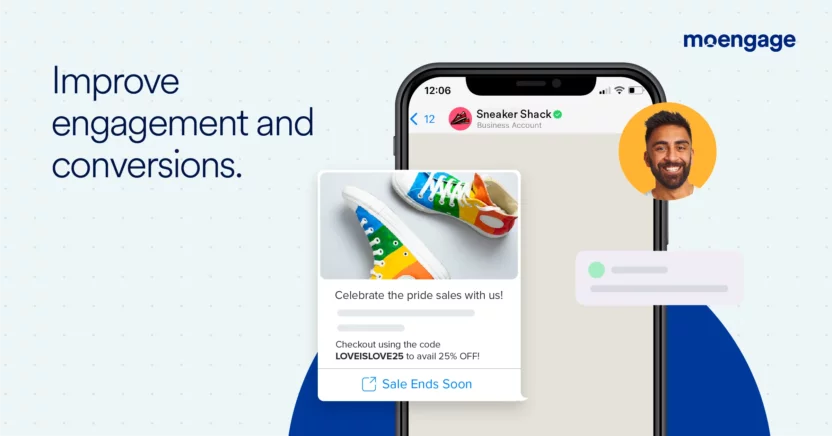
A type of multichannel marketing, conversational commerce employs different strategies across different platforms, depending upon the target audience.
A comprehensive understanding of the demographics of social media platforms and online chat applications is vital to creating a good conversational commerce strategy.
The Buzz Surrounding C-Commerce
There’s a lot of attention given to conversational commerce as it makes customer interactions easier by opening a direct line of contact with the customer, making it easier for them to engage with you.
It aims to create a customer experience that emphasizes ease, speed, and personalization. Conversational commerce helps simplify the buyer’s journey by enabling the brand to respond instantly to potential customer queries.
It virtually eliminates the need to meet customers physically. With the help of voice assistants and live chat options, C-Commerce helps businesses assist customers of all types.
This kind of conversational marketing can be very helpful in resolving the challenges that new customers face in using a brand’s products or services. Instant responses ensure high levels of customer engagement and build a strong relationship with the customer.
How Is Conversational Commerce Useful?
Eliminating Bottlenecks From the Buyer’s Journey
Many E-commerce websites are now starting to look towards conversational commerce to ensure their customers have a hassle-free online shopping experience.
Especially in cases of cart abandonment, C-Commerce helps a brand to immediately reach the customer on a messaging app, attempting to resolve any issues they may be facing and helping them to complete their purchase.
For example- Apollo Hospitals, a premier healthcare and pharmaceutical company in India, uses WhatsApp to reach out to customers if they abandon their cart while purchasing medicines on their app. While nudging the customers to complete their transactions, they also inform customers of their subscription service, highlighting the additional discounts the customers would get on subscribing to it. Additionally, they continue sending customers frequent messages about offers and discounts and also push their in-app AI-driven health assistant for customers to check their symptoms and consult with top doctors.
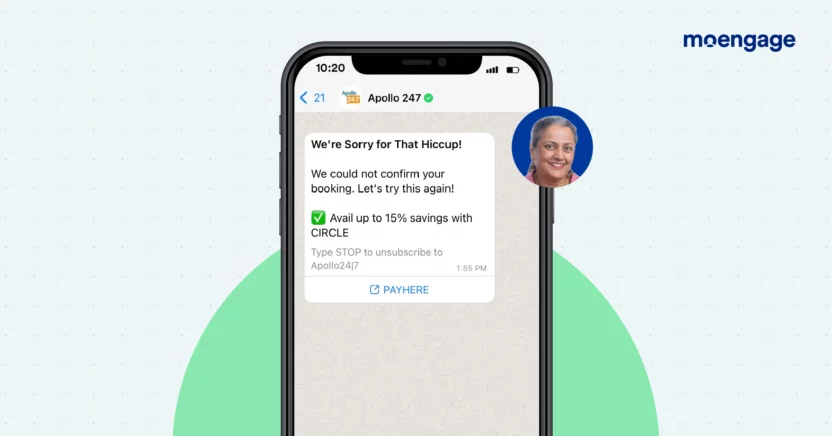
Different customers might be at different stages of their purchase cycle, facing unique challenges that might not have a single solution. Using conversational commerce allows a business to easily provide recommendations personalized to the challenges a customer is facing.
Conversational commerce can also help to improve conversion rates by addressing different hiccups in the sales funnel.
While brands can do their best to educate potential customers in the limited time that they have with them, C-Commerce helps in reaching out to the same prospect even after this via messenger apps, attempting to hold their interest and push conversion.
Better Personalization and Improved Customer Satisfaction
While E-commerce does provide some scope for personalized recommendations, conversational commerce takes that a step further and provides a completely personalized experience to its customers.
Customer data can help sort the customers into different buckets based on their expected purchasing journey. These customers can then be reached out to in a personalized manner.
More Retail, a chain of supermarkets across India, came up with a campaign where they sent WhatsApp messages in regional languages, highlighting their offers and discounts. This was accompanied by a nudge to download their app, which gives customers several additional benefits.
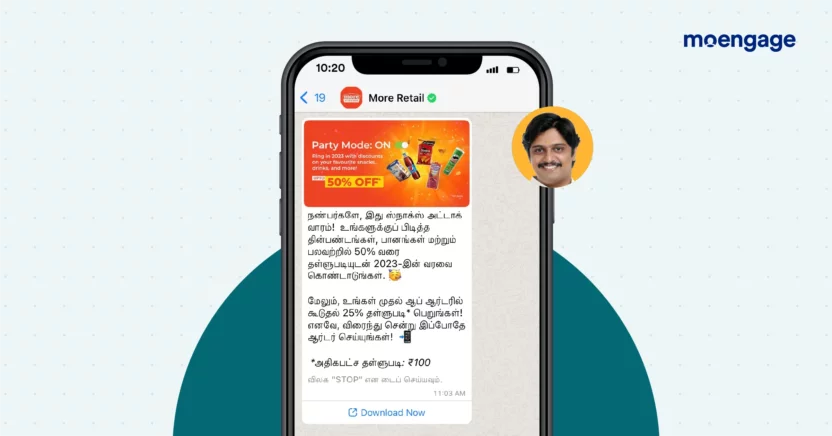
Such campaigns in regional languages can be particularly useful when brands are reaching out to a very large number of consumers, a scenario where language can be a barrier.
Conversational commerce channels like WhatsApp and Facebook Messenger provide plenty of options for businesses to customize the way that they want to reach out to their consumers.
Many businesses also provide a live chat option on their website to be able to provide personalized advice to customers based on what they are looking for. This provides the customer with a level of convenience that makes them comfortable with the brand, ensuring a higher customer lifetime value.
Ensuring Continuous Engagement and Boosting Retention
Most conversational commerce platforms provide several automation options that allow businesses to reach out to customers at a regular frequency.
While an average consumer might not be influenced by a single message from a brand, frequent messages based on the customer’s requirement are bound to catch their attention. What’s key is how engaging the content is.
Such a strategy can ensure that the consumers interact with the brand, making it a lot easier for marketing teams to analyze consumer behavior and create a retention strategy.
A good example here is how JioFiber, a high-speed internet service in India, uses WhatsApp to send frequent messages to potential customers to subscribe to their service. JioFiber sends bi-weekly WhatsApp messages, each with almost the same content, but a different image every time, showing the various benefits a customer would get by subscribing to JioFiber.
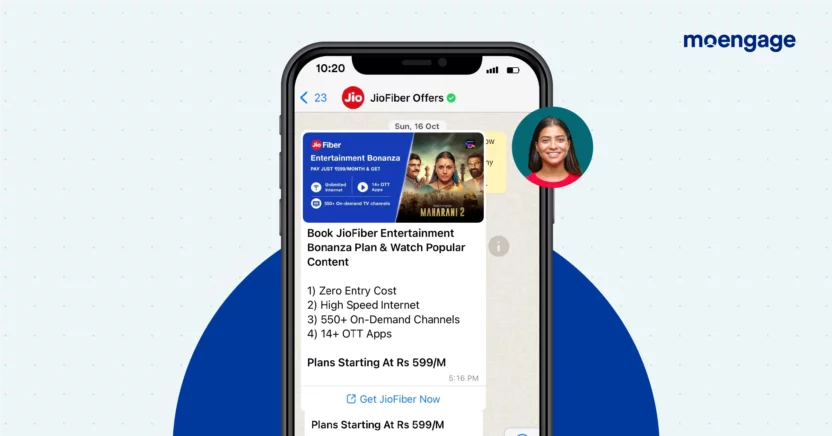
The advance in conversational AI also helps brands set up fully automated, personalized conversations without the risk of human error or delay.
Better Feedback Mechanisms and Reduced Churn
Another factor that makes conversational commerce important is the ease with which brands can collect feedback from customers. A lot of brands use an automated voice assistant to collect feedback from customers, which is instantly collected and sorted.
Sending messages on a chat platform requesting feedback is also an effective way for businesses to get feedback from customers, even providing them with a multiple-choice rating that they can choose from.
Such valuable feedback can go a long way in improving the product or service to suit the needs of the customers.
As with the case of abandoned shopping carts we looked at before, conversational commerce can help identify the reasons for churn among customers and provide solutions for it based on the interaction with the customer.
Providing an instant voice chat option helps ensure timely human intervention in specific situations where automated solutions might not be of help to the customers.
Why Should Companies Use Conversational Commerce?
Pushing for Maximum Conversions
Conversational commerce is looked at as a pathway to meet marketing and sales goals because of its ability to drive conversions. Unlike conventional marketing channels, C-Commerce can push consumers in multiple ways to complete a transaction.
Consider the example of Urban Company, which apart from using WhatsApp to promptly collect feedback from customers about their service, also promotes their services like deep cleaning, bathroom cleaning, servicing of home appliances, etc., with frequent messages.
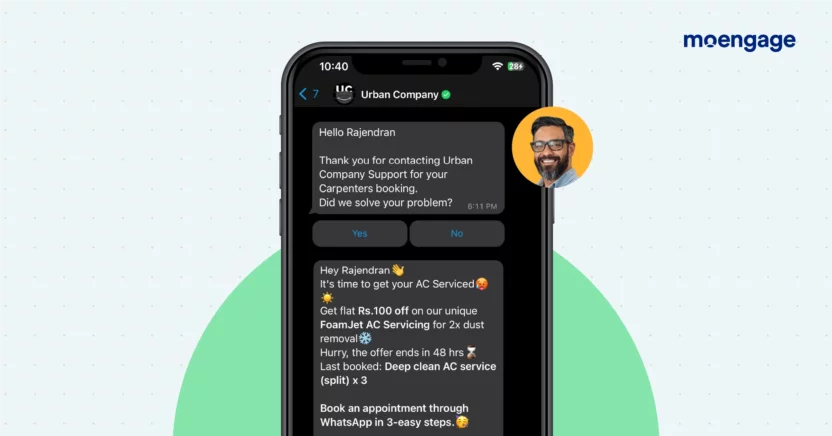
Chances are that one of the days you look at a message for a deep cleaning service, you decide that you need it and go for it. But such frequent direct messaging with consumers can be a double-edged sword. Sending too many messages too frequently can cause a negative association with the brand. So it is important that such campaigns take into account the behavior patterns of customers.
Behavior-centric C-Commerce
As we just saw, a good understanding of customer behavior is crucial to a comprehensive conversational commerce strategy. A conversational commerce tool might provide you the option to send a message to your customer daily or even hourly, but with such great power comes great responsibility.
PVR Cinemas in India represents a good example of brands respecting the personal messaging space of the customer and also keeping them updated on important transactions and events. While the brand does message its customers on WhatsApp, it is reserved only for certain cases, like sending the details of movie tickets a customer has booked or sending them a receipt for their purchase of food & beverages. This ensures that the customers value the messages that they send and do not automatically dismiss every message as spam.
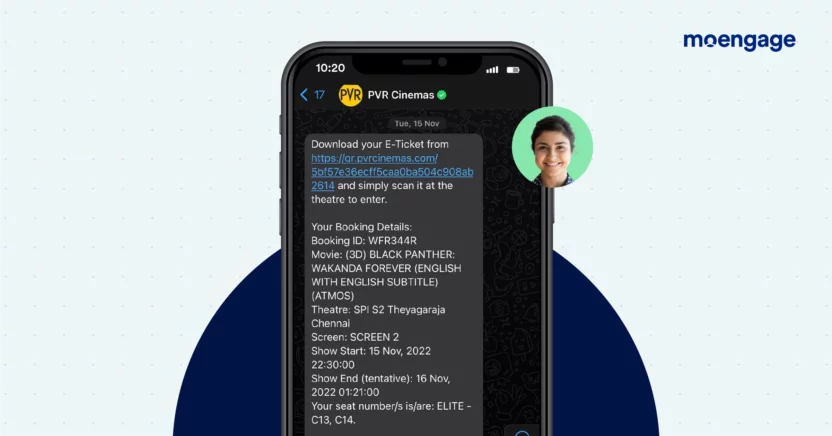
Marketers must first categorize customers based on the type of messages they would like to receive and how frequently they would prefer these messages.
There might be one set of customers of a particular age group who respond very well to messages with offers and promotions and another set of customers of a different age group that likes to be sent blogs and videos.
Mix up both these cohorts, and you will see your conversion numbers immediately dipping. That’s why it’s vital to ensure proper customer segmentation based on their preferences.
Deep Dive Into Customer Preferences
One of the benefits of conversational commerce is that with increased interactions with the customers, you get valuable information about their tastes & preferences.
What this data shows should ideally form the basis of all the messaging interactions with your customers.
Such data can range widely in scope: their purchase behavior, the brands they prefer, how frequently they engage with brand communications, and whether they would like product recommendations.
The key to doing conversational commerce work is customer communication that takes into account what the customer needs and their preferences.
Examples of Brands
L’Oréal
There are many examples of C-Commerce driving a large number of conversions. One such success story is L’Oréal. L’Oréal Malaysia announced a 24-hour sale and a full-day virtual beauty festival on Facebook Live for its luxe division.
During the virtual festival, L’Oréal kept promoting different products with links to purchase the products on Facebook Messenger. L’Oréal Malaysia managed to bring in one month’s worth of online sales via their Messenger experience.
Flipkart
Another notable example is Flipkart’s voice assistant available in its grocery store Supermart to enable consumers to buy products easily using voice commands in multiple languages.
The AI platform is built to automatically detect the language spoken by the customer, and in real-time translate, transliterate, and understand the customer’s intent to have engaging shopping-related conversations in multiple Indian languages.
Such a feature will not only make ordering easier but also expand the customer base of the E-commerce company to include customers who would not know how to operate a mobile phone or use the internet. This move is said to be transforming the Indian E-commerce landscape, with several competitors soon introducing a similar feature.
Zepto
Zepto is among the top players in the grocery delivery business in India, a space that is growing rapidly with many players in the market. In a market with such cut-throat competition, offering discounts or other incentives like free delivery can make a huge difference. That’s what Zepto decided to do, using WhatsApp.
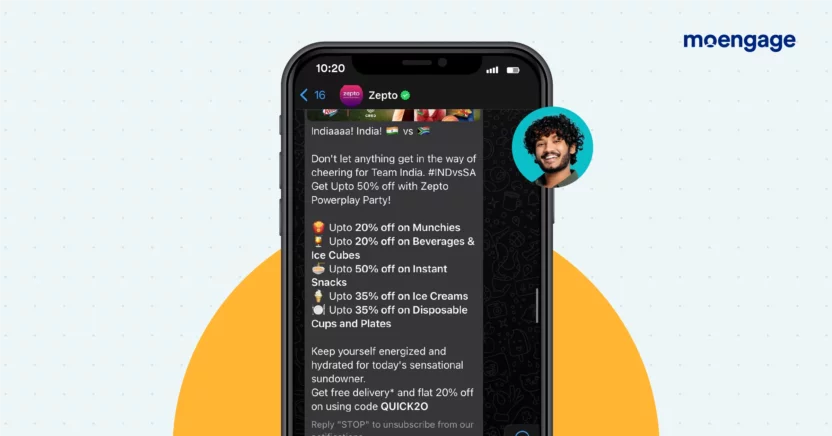
Zepto sends weekly messages to its customers on WhatsApp, highlighting the offers they have for the week. Zepto has also managed to keep this engaging by providing different kinds of offers every week. While one week there is a flat discount offer, another week there is free delivery or discounts on specific products.
This keeps the customer engaged and on the lookout for new offers and schemes. By frequently messaging customers with such offers, Zepto constantly stays in the memory of its customers, making them instinctively choose it over its other competitors.
The Way Ahead
Conversational commerce is already becoming one of the biggest tools being used to reach out to customers. Its importance and impact will only grow in the coming years, and as a marketer, if you want to stay ahead of the curve, now is the time to become a pro at the ways of conversational commerce.
The personal connection C-Commerce gives, and the ability to have a two-way conversation with the customers make it a preferred mode of communication for big and small businesses.
From E-commerce websites to small local eateries, conversational commerce can be used by businesses of all types, kinds, and sizes with one objective: Understanding the customer better to be able to serve them better.
While conversational commerce and the interactions it facilitates with the customers can be very exciting, it’s important for a brand to set standards for the way that they want to message their customers.
Especially because conversational commerce involves reaching the personal messaging inbox of customers, the decision of what is and what is not relevant content becomes significant. Bombarding customers with spam messages can completely alter their customer journey.
But if done correctly, conversational commerce will not only take your brand where you want it to be but also build a strong, trust-based relationship with your customers, something that money cannot buy and only conversation can.



